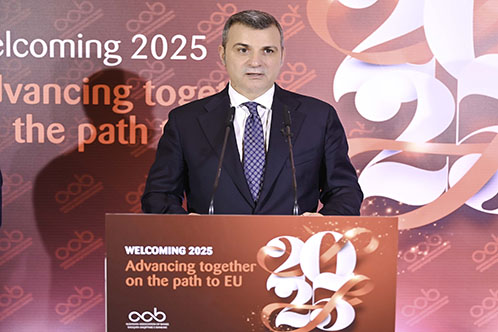BANK OF ALBANIA
PRESS RELEASE
Governor Sejko at the end-of-year meeting organised by the Albanian Association of Banks
Publication date: 19.12.2024
Honourable AAB Chair,
Dear banking system executives,
Dear friends and colleagues,
We are gathered once again at this year-of-end event as another challenging year has passed very quickly. Thank you for the invitation; it has now become a tradition to brief together the main highlights taking place in the economy, the financial and banking sectors, and the outlook for the next year.

The prudential normalization of monetary policy has enabled inflation stabilize, without undermining the economic growth trend and the financial stability of Albania. The banking system, in playing a crucial role as transmitting these policies, stands at the heart of these developments. As I have pointed out before, the developments over the course of the year we are leaving behind empowered Albania to have – at the same time – one of the lowest inflation rates, one of the highest economic growth rates, a stimulating financial environment, and a rapid increase in lending.

During 2024, the Albanian economy recorded a growth rate of around 4%, generating more employment, higher wages, and elevated income for households and businesses. The latter were also supported by the declining inflation, which fell to 2.2%, halving compared to the previous year, in turn contributing to easing the cost burden on both households and businesses. In parallel with these developments, the key financial and economic indicators improved significantly. Public debt and external debt reduced to the lowest levels in over a decade, the financial balances of households and businesses remained solid, while the banking sector continued to consolidate its role as an effective financial intermediary. The financial environment with low interest rates, coupled with the proactive approach of banks towards lending, bolstered a sharp growth in credit, resulting around 16% higher than in 2023, in turn providing a vital support for economic activity.

Moody’s and Standard & Poor’s, the two prestigious credit rating agencies, upgraded the risk rating of Albania’s sovereign debt, thus certifying this positive economic overview. This development is positive for both real sector and financial sector, as it reduces the perceived risk in international markets and decreases the cost of financing in it.

I take this opportunity to underscore that the banking sector, in addition to its visible efforts to support the economy, plays an absolute and decisive role in preserving the financial stability and soundness.

During the first nine months of 2024, the share of the financial system's assets to GDP grew to 92% in annual terms. Almost all segments of the financial system have reported an increase in their assets during this period. Banking sector continues to dominate the financial system, accounting for around 91% of total assets. The stability of the banking sector, in terms of capitalization and profitability, is considered positive. Its capital adequacy ratio (CAR) reached 20.2% and remains well above the regulatory minimum. The Bank of Albania also continues to regularly monitor the fulfilment of macroprudential capital buffers and the minimum requirements on regulatory capital instruments and eligible liabilities laid down in the Law "On the Recovery and Resolution of Banks in the Republic of Albania." The results of the stress test and the stress-testing exercises for the 2024–2026 horizon display that the banking sector remains resilient against potential macroeconomic shocks.
The net result of the banking sector, as at end of October 2024, was significantly higher compared to the same period in 2023. The balance sheet of banks grew by 6% year-on-year by the end of October 2024. Deposits of clients remain the main source of funding for banks. As end of October 2024, they amounted ALL 1.652 billion and grew by 5.3% in annual terms.
On the other hand, the outstanding credit amounts ALL 811 billion, up by 11.2% compared to the level reported by the banks at the end of October 2023, while the average annual growth of outstanding credit stock for the period January-October 2024 resulted 14.5%. The quality of the banks' loans improved, while the non-performing loans (NPL) ratio to total loans reduced to 4.6%. The liquidity position of the banking sector remains at satisfactory levels, as well as its exposure to market risks.
Last month, we succeeded in finalizing our accession to SEPA (Single Euro Payments Area), by marking another achievement in our efforts over the last five years to modernizing the payment system. Thus, we became one of the first countries in the Western Balkans to be accepted into this area. This European initiative simplifies and harmonizes euro payments for participating countries in these schemes. For Albanian banks, SEPA represents an important framework for enhancing the efficiency of cross-border payments and integrating into the European financial system, as it means faster and more cost-effective euro-denominated transactions for your clients, businesses, and individuals.
Digital expansion, as a global trend, has certainly been and remains an important priority within your agendas. Many of you have augmented the number and opportunities of digital services and platforms, in turn improving operational efficiency and expanding remote access for your clients. This year also marked the first year of "open banking” implementation. We expect a further and responsible expansion in meeting the ever-changing needs of clients and consumers as the number of non-bank fintech operators is going up.
Dear participants,
In addition to the above, along with the developments and successes attained so far, there is still work to be done. To this end, your future objectives should focus in further fostering the sector and your continued contribution to economic growth, as well as in boosting innovation. In particular, allow me to list a few of them:
- Credit penetration: Despite the growth pace in lending, credit to the private sector is relatively low compared to regional countries. This indicates an unemployed potential in supporting businesses and households. In this context, and taking into account the specifics of the Albanian economy, the micro, small, and medium-sized business sector becomes of particular importance as the main segment of active businesses operating in Albania.
- Maintaining the low level of the NPLs ratio: The rapid credit growth taking place in recent months poses a potential risk to the quality of credit in the future. Despite the current low level of non-performing loans (NPLs), banks should remain focused on further reducing loans which are classified as non-performing and ensure robust assessments of credit risk in their portfolios.
- Promoting the use of the domestic currency: Intensifying efforts in bolstering the use of LEK for deposits and loans would: reduce dependence on foreign currencies; lower the exposure to exchange rate risk; and enhance the monetary policy effectiveness in Albania.
- Limited financial inclusion: A part of the population, particularly in rural areas, remains underbanked by the banking sector, thus reducing access to credit and other financial services. Your enhanced focus on underbanked communities and small businesses is important for long-term economic growth and stability.
- Digital transformation: The adoption of innovative technologies needs to be accelerated at a comparable pace to more advanced markets. Banks should continue investing in technology, by: highlighting the need for digital banking solutions to improve customer experience; addressing the challenges of cybersecurity that accompany them; and fostering clients’ confidence in online services:
- Climate risk and green finance: The implementation of the national strategy on climate risk and the alignment of the banking sector with the new guidelines on climate risk management will be at the centre of increased requirements throughout 2025. The Bank of Albania encourages you to increase financing for green and sustainable projects.
- Harmonisation with the EU standards and the Acquis Communautaire will continue in the next year as well. Special attention is required, particularly regarding the alignment with the Anti-Money Laundering (ALM) requirements and measures and financing of terrorism (CFT). In this context, you should engage in continuous efforts and investments in the framework of the 6th round of evaluation of MONEYVAL for Albania.
- Further improving payments: membership in SEPA facilitates standardized euro-denominated payments across borders. It is now time for the banking system to commit to being fully integrated into SEPA schemes, through investing in technology, infrastructure, and staff training in order to meet the technical and regulatory requirements.
- Customer-focus: Enhancing customer satisfaction through personalized banking services, implementing financial education programs, and providing competitive banking solutions are prerequisites for strengthening your role in the economy and achieving long-term sustainability.
Dear guests,
I strongly believe in our strong and close collaboration to addressing in an effective manner the future challenges that lie ahead. On its part, the Bank of Albania will remain an active partner for the country's development throughout the coming year.
I wish you a successful and prosperous 2025!

 Linkedin
Linkedin
 Twitter
Twitter
 Facebook
Facebook
 Instagram
Instagram
 Flickr
Flickr
 RSS
RSS
 Subscribe
Subscribe
 Feedback
Feedback